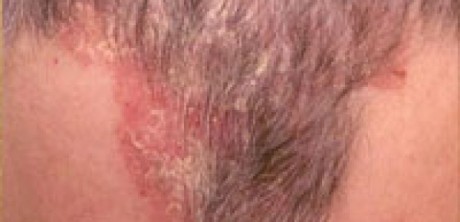Scalp Eczema Hair Loss Information
 If you have scalp eczema, then you know just how horribly irritating and potentially embarrassing it can be. However, you are not alone. Many people worldwide also suffer daily from this problem. Eczema is a condition that can show up anywhere on the body where there is skin, but for some reason scalp eczema is more prevalent than any other variety of the malady. Unfortunately, eczema has no cure, but can be controlled with medication and attention to the environment, and has been known to clear up and never return, though the potential is always there.
If you have scalp eczema, then you know just how horribly irritating and potentially embarrassing it can be. However, you are not alone. Many people worldwide also suffer daily from this problem. Eczema is a condition that can show up anywhere on the body where there is skin, but for some reason scalp eczema is more prevalent than any other variety of the malady. Unfortunately, eczema has no cure, but can be controlled with medication and attention to the environment, and has been known to clear up and never return, though the potential is always there.
Now that we know the difference between dandruff and scalp eczema as well as their cause, the next step is treatment or management. First though, if you believe that your dandruff is severe or if you think that you might actually have scalp eczema/seborrheic dermatitis, it is really important to have this diagnosed by a doctor. The reason is that in severe cases, the simplest treatments may not work effectively enough on their own and what you may require is a management plan.
Here are the methods used to treat dandruff and scalp eczema:
1. Avoid Natural Oils
If you have dandruff or scalp eczema, it is very important to know that many natural oils actually contain the oil that feeds the fungus Malassezia that causes the condition. This oil, oleic acid is present in the popular four natural oils – coconut oil, shea butter, olive oil and castor oil. It would be worth your while avoiding using these oils so as to not exacerbate the condition.
 2. Over the counter Anti-Dandruff Shampoos
2. Over the counter Anti-Dandruff Shampoos
These are the standard first treatment for dandruff. They are very effective and routinely stop flaking and itching rapidly. The shampoo contains antifungal agents such as pyrithione zinc and ketoconazole which work on reducing fungus on the skin. Many dandruff shampoos require that you wash your hair between 3-5 times per week to help get the antifungal activity to the right level. After flaking and itching has stopped, it is indeed possible to go back to whatever your normal wash routine was using the antidandruff shampoo either as your regular shampoo or just alternating it with your regular shampoo. If this is not effective, a prescription strength shampoo may help.
3. Management of Scalp Eczema
For some people with scalp eczema, simple over the counter anti-dandruff shampoos may work but for others they will not. The best thing to do is to work out a management plan with your doctor. You will be able to try out and see which method of treatment works best for you. The options include prescription strength shampoos and anti itch creams for the vast majority of cases. In more specialised cases where there is no improvement, oral antifungal treatments and even steroid treatments can be considered. This is why it is important to get scalp eczema diagnosed.
For information on award winning hair loss products Zenagen and Zenagen Hair Loss Information
